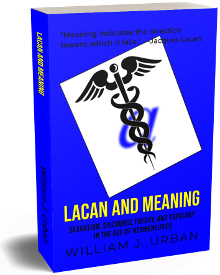LACAN AND MEANING
SEXUATION, DISCOURSE THEORY, AND TOPOLOGY IN THE AGE OF HERMENEUTICS
CHAPTER 3
LACAN ON MEANING
— page 56 —
future date; its present status is thus what it ‘will have meant’ to the subject. In terms of meaning, the past is in a sense more flexible than the future.
Given this understanding, Lacan maintains that the psychoanalyst’s most formidable technique is to ‘punctuate’ the speech of the patient. Utilizing terminology from an earlier écrit on logical time, Lacan argues that with proper punctuation, the psychoanalyst ‘annuls the times for understanding in favor of the moments of concluding which precipitate the subject’s meditation toward deciding the meaning to be attached to the early event.’13 More directly, he writes that ‘[p]unctuation, once inserted, establishes the meaning; changing the punctuation renews or upsets it; and incorrect punctuation distorts it.’14 The exact nature of the punctuation, whether it takes the form of repeating a word the subject has just uttered or through a simple clearing of the throat, is less important when compared to its proper timing. Here lies the rationale for his infamous ‘short sessions’ which is more accurately termed ‘variable length sessions’ since there is no telling when a favorable opportunity will arise to suddenly terminate the session. He writes:
‘It is, therefore, a propitious punctuation that gives meaning to the subject’s discourse. This is why the ending of the session – which current technique makes into an interruption that is determined purely by the clock and, as such, takes no account of the thread of the subject’s discourse – plays the part of a scansion which has the full value of an intervention by the analyst that is designed to precipitate concluding moments. Thus we must free the ending from its routine framework and employ it for all the useful aims of analytic technique.’15
In other terms which are maintained throughout this paper, punctuation has the effect of halting the subject’s ‘empty speech’ to produce instead a genuine ‘full speech.’
As Lacan moves into his structuralist period, the hermeneutical phenomenological shell of these insights is removed in order to expose and rearticulate their underlying logic using the pure language of signifiers.
simple collection of facts. Rather, the particular way they have been ‘taken up’ – say, from the perspective of the work of early 1970s Lacan – is what is important.
13 Ibid., 213. The écrit in question is “Logical Time and the Assertion of Anticipated Certainty” (1945).
14 Ibid., 258.
15 Ibid., 209.
full text of Lacan and Meaning
FREE Lacanian-themed puzzles

